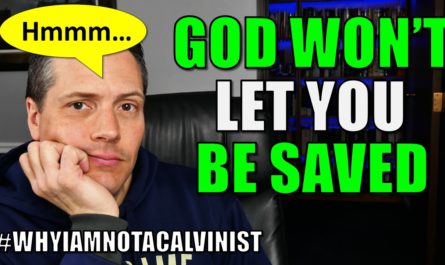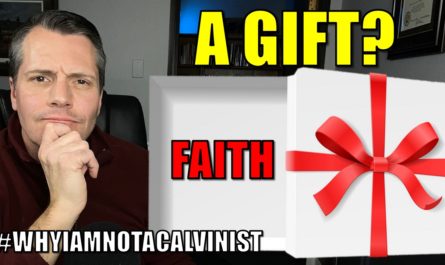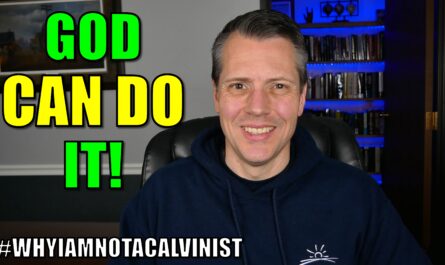Is the gospel hidden from those whom God has not elected for salvation? It may seem so when we read these verses:
But even if our gospel is veiled, it is veiled to those who are perishing, whose minds the god of this age has blinded, who do not believe, lest the light of the gospel of the glory of Christ, who is the image of God, should shine on them. (2 Corinthians 4:3-4)
If the gospel is “veiled to those who are perishing,” then that means they would not be able to understand it, right? They can only believe and be saved when God unveils the gospel to them, which, according to Calvinism, will only take place after God regenerates them.
As usual, we must consider the context before jumping to conclusions. To do so, we need to back up to chapter 3, where Paul discusses the supremacy of the new covenant over the old one.
Before we see what he says about the veil, though, it is important to understand how he compares the two covenants. He talks about two covenants; both written down. The old one was on “tablets of stone” and the other was written “not with ink” but “by the Spirit…on tablets…of the heart” (2 Corinthians 3:3).
The old covenant, which had its birth in the Ten Commandments (hence the “tablets of stone”), was insufficient to reconcile man and God because of man’s propensity to sin. It is, therefore, what Paul will call “the ministry of death.”
The new covenant, however, brought about by the Spirit’s conviction on the heart and made possible by the sacrifice of Jesus, proved superior, because it made reconciliation possible.
With the differences between the covenants in mind, let’s see what Paul had to say.
But if the ministry of death, written and engraved on stones, was glorious, so that the children of Israel could not look steadily at the face of Moses because of the glory of his countenance, which glory was passing away, how will the ministry of the Spirit not be more glorious? (2 Corinthians 3:7-8)
When Moses came down the mountain carrying the tablets engraved with the Ten Commandments, his face glowed from his encounter with God. This freaked out the people so much that he had to cover his face with a veil (Exodus 34), thus hiding the glory associated with the Commandments. Paul’s point is this: if there was that much glory in the Ten Commandments and the Law, whose only purpose was to show that we cannot be saved on our own merit, how much superior is the New Covenant, in which we can be saved on the merit of Christ?
Paul employs the veil of Moses as an analogy for hiding something. Moses hid his face from the people so they could not see the glory of the old covenant. The new covenant, however, should not be hidden behind a veil. It should be boldly proclaimed.
Therefore, since we have such hope, we use great boldness of speech— unlike Moses, who put a veil over his face so that the children of Israel could not look steadily at the end of what was passing away. (2 Corinthians 3:12-13)
Unfortunately, for many people, the veil still shrouds the glory of the old covenant.
But their minds were blinded. For until this day the same veil remains unlifted in the reading of the Old Testament, because the veil is taken away in Christ. But even to this day, when Moses is read, a veil lies on their heart. (2 Corinthians 3:14-15)
These folks do not completely understand the old covenant because they do not understand Christ, who came to fulfill the Old Testament. How, then, can the veil be removed?
Nevertheless when one turns to the Lord, the veil is taken away. (2 Corinthians 3:16)
If they would turn to Jesus, the veil over the old covenant would be removed. They would understand that the purpose of the old covenant was fulfilled in Christ—the only one who could actually fulfill all its commands.
Because the gospel clarifies the purpose of the Law, those who read the Old Testament without the lens of Christ do not fully appreciate it. It is as if they read it through a veil. They can get some of its meaning, but not its full purpose. Turning to the Lord removes the veil that hides the glory of the Old Testament. Suddenly it all makes sense.
So, now, with the understanding the Paul is using the analogy of the veil to refer to hiding the true nature of something, let’s return to our primary verses. We will see that, for some, the true nature of the new covenant (gospel) is also hidden to some.
But even if our gospel is veiled, it is veiled to those who are perishing, whose minds the god of this age has blinded, who do not believe, lest the light of the gospel of the glory of Christ, who is the image of God, should shine on them. (2 Corinthians 4:3-4)
So, the question is this: Is God hiding the gospel or is it veiled for some other reason?
We find the answer right in the text if we read it carefully. The gospel is hidden to those whose minds have been blinded by the Devil, the “god of this age.”
The blindfold may be so-called “science” or doubts or false historical information. Whatever it is, it has obscured the truth of the gospel.
How can a person remove the blindfold? Remember that this is a blindfold of the mind. So, to remove it, we have to inform the mind with accurate information. While understanding the gospel is insufficient for salvation, it is a necessary first step.
If you do not believe, embark on a serious consideration of Christianity. Allow yourself to see it through to its logical conclusion. Ask yourself the following questions and seriously consider the answers.
- How and why did everything begin to exist?
- Is there any objective basis for right and wrong?
- Were the Scriptures given to us by God or are they just a compilation of man’s thoughts?
- Does anything exist outside of the material world?
- Did the resurrection of Jesus really happen?
Many who reject the gospel do, of course, have answers for these questions. However, I find them less than satisfactory. You would do well, then, to engage with them yourself and see if approaching Christianity with an open mind will remove the veil that separates you from believing the gospel.
As Christians, we can help those who are blinded to the gospel. One of the ways we can do this is to provide solid answers to the above questions. I think it’s time to put an end to naïve, superficial, and hypocritical Christianity. Skeptics who are honestly searching for the truth need us to give them reasons for the hope that is in us.
Ultimately, each person must make the choice to turn to the Lord. Only then will the full understanding of the gospel result in eternal salvation.



